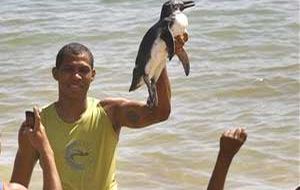MercoPress. South Atlantic News Agency
More Magellanic penguins washed up to Brazil beaches
 A boy holds up a penguin at in Salvador, northeastern Brazil
A boy holds up a penguin at in Salvador, northeastern Brazil More than 1000 juvenile Magellanic penguins have washed-up either dead or dying along the Brazilian coast and as far north as Natal in Rio Grande do Norte, 3000 km north of Sao Paulo. IFAW (International Fund for Animal Welfare - www.ifaw.org ) (*) deployed a team of penguin rehabilitation experts to assist local animal centers that are handling penguins for the first time.
"This event appears to be a natural occurrence and has been seen 2 or 3 times in the last 20 years, resulting in the death of thousands of birds. What really took us by surprise this time is the huge increase in numbers," said Valeria Ruoppolo of IFAW. The Magellanic penguins ( Spheniscus magellanicus) breed in large colonies in southern Argentina and Chile and migrate north as far as Southwest Brazil between March and September. According to experts, there is a flow of warmer water (1C higher than normal), which has caused the juvenile penguins to keep going north, past their usual range, where they are unable to find adequate food. Almost all of the penguins being found on beaches in northeastern Brazil have been juveniles and since they are starving, they come into care in an extremely debilitated state. IFAW team of experts is working with Instituto Mamiferos Aquaticos in Salvador, Bahia and Instituto ORCA in Vitoria, Espiritu Santo, to help save as many penguins as possible. The Brazilian Institute for Environment and Renewable Resources (IBAMA) welcomed IFAW expertise for the rehabilitation of these stranded penguins. Penguins in rehabilitation are individually checked for their treatment evolution, fed fish supplemented with vitamins, and spend time swimming to recover the strength and approve health requirements needed to be released back to their ocean home. IFAW staff is working closely with the authorities at IBAMA to advise on bird release criteria and suitable locations to release these birds, ensuring they have fish available to survive. IFAW experience in rehabilitation has saved the lives of tens of thousands of penguins. In 2000, IFAW helped save an entire species -- rehabilitating and releasing 19,000 African Penguins caught in the Treasure oil spill off South Africa. Today, IFAW oiled wildlife response team is widely recognized as the world's finest. At the end of September the recovered penguins will be flown from Salvador to Arraial do Cabo in the state of Rio do Janeiro and let free so they can return to Patagonia. Another lot of 200 currently under treatment in Rio's zoo will also be released then. (*) IFAW, International Fund for Animal Welfare. Founded in 1969, IFAW works around the globe to protect animals and habitats, promoting practical solutions for animals and people. To learn more please visit www.ifaw.org.




Top Comments
Disclaimer & comment rulesCommenting for this story is now closed.
If you have a Facebook account, become a fan and comment on our Facebook Page!